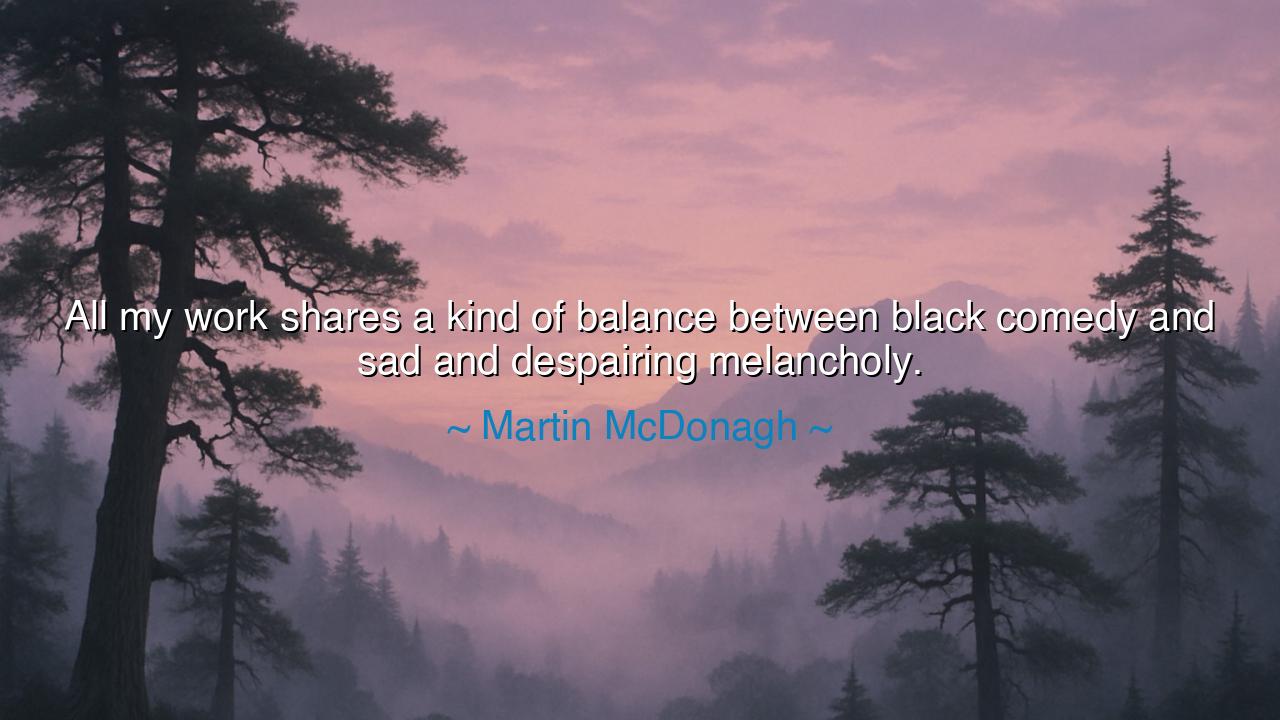
All my work shares a kind of balance between black comedy and sad
All my work shares a kind of balance between black comedy and sad and despairing melancholy.






There is a piercing truth in the words of Martin McDonagh, who said, “All my work shares a kind of balance between black comedy and sad and despairing melancholy.” In this statement, he unveils the eternal tension between laughter and sorrow, between the absurdity of life and the heaviness of its meaning. McDonagh, a playwright and filmmaker of unflinching honesty, recognizes what the ancients once knew: that to speak truthfully of human existence, one must hold both light and darkness at once. For in the deepest tragedy, there is irony; and in the heart of laughter, there is pain. The wise do not divide these emotions — they weave them together into understanding.
The origin of this quote lies in McDonagh’s own artistic vision, shaped by a world that is both cruel and comic. Born of Irish descent, he wrote stories of ordinary people caught in the absurd brutality of life — tales where death, regret, and guilt dance alongside wit, defiance, and laughter. His works, such as In Bruges or The Pillowman, capture this uneasy harmony: a joke uttered in the shadow of a grave, a confession wrapped in irony. It is this balance that defines his art — for he knows that to depict life without its darkness is to lie, and to dwell only in despair is to wither. True storytelling, like true living, requires both — the laughter that resists the void, and the melancholy that reminds us of its presence.
The ancients understood this paradox deeply. In the Greek tragedies, the playwright Euripides would often let irony mingle with horror — gods who mock, mortals who weep and yet smile through their ruin. The philosopher Aristotle wrote that comedy and tragedy are siblings: one exposes the foolishness of man, the other his suffering. Yet both aim for catharsis, the cleansing of the soul. McDonagh stands in that same lineage. His black comedy does not mock suffering; it unveils it. By making us laugh in the midst of despair, he forces us to confront our contradictions — that we can cry and chuckle in the same breath, that we can be both cruel and kind, fragile and immortal, at once.
To understand McDonagh’s wisdom, one might look to history’s own balance of darkness and laughter. Consider Winston Churchill, who, even amid the fires of war, found strength in humor. When asked how he could jest in the face of destruction, he replied, “If we didn’t laugh, we should cry.” It was not denial, but defiance — laughter as the last weapon of the human spirit. In that spirit, McDonagh’s art, though grim, becomes redemptive. By laughing at pain, we rob it of power. By facing despair with irony, we transform tragedy into endurance. It is the laughter of the condemned man who, facing the gallows, still manages to smile — not because he is blind to death, but because he sees it clearly and chooses to remain human in its shadow.
This melancholy, however, is not weakness. It is the soul’s awareness of loss, of impermanence, of the fragile beauty of life. McDonagh’s “despairing melancholy” is not hopelessness — it is a recognition of how deeply we feel, how much we love, and how every joy carries within it the seed of its ending. The ancients called this awareness pathos, the noble sorrow that ennobles the heart. To feel deeply, to mourn, to long — these are not burdens but proofs of aliveness. In McDonagh’s vision, to laugh at one’s suffering does not mean to reject it; it means to embrace it with understanding.
The balance he speaks of, then, is the balance of the human condition itself. We live between heaven and earth, between comedy and tragedy, between creation and decay. To lean too far toward either is to lose perspective. Those who see only darkness become bitter and blind; those who see only joy become shallow and naïve. The enlightened soul walks between — knowing the weight of sorrow but still choosing to smile. McDonagh’s art teaches us to hold both emotions in our hands without letting either consume us. It is an act of spiritual strength — to look upon the absurd and find meaning, to face despair and still make a joke, to weep and laugh in the same heartbeat.
The lesson, my children, is this: life is neither pure laughter nor endless lamentation, but the dance between them. When you are wounded, do not lose your humor; when you rejoice, do not forget your fragility. The one who can see both the comedy and the tragedy of existence is the one who truly understands it. Seek not to escape sadness, for it deepens your soul; seek not to avoid laughter, for it sustains your courage. Walk with balance, as McDonagh does, and you will discover that wisdom lies not in escaping life’s contradictions, but in embracing them.
For as Martin McDonagh reminds us, the world is both ridiculous and sacred — a theater of cruelty and tenderness intertwined. And in that theater, the most human thing we can do is to laugh honestly, grieve deeply, and continue, always, to create meaning out of both.






AAdministratorAdministrator
Welcome, honored guests. Please leave a comment, we will respond soon